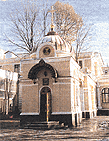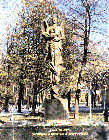| |
|
|
|
It should be admitted that the Police Museum has existed
in Kharkiv for a long time now. There were several such museums in
the former Soviet Union, but our museum was the highly appreciated
by high rank police officials from other towns. There were even attempts
to emulate Kharkiv museum. But during the period of separation of
former republocs and "desovietization" the museum was forgotten. |
|
|
|
|
|
Fortunately there are people in Kharkiv who realise
that history is history no matter what some other people would want
it to look like. It is memory and experience of the past generations,
and without realising it nothing can be achieved neither now nor in
the future. |
|
|
|
| |

|
| |
|
| |
|
|
| |
The museum was restored and taken care of by the chief
of internal affairs administrative department Vitaly Muzyka who initiated
and closely watched over its restoration. Moreover the decision was
made to create a commemorative complex with a monument to police officers
killed by criminal offenders during piece time. This monument was
set up in 1995 and became an integral part of the Alchevskys house,
the chapel, and the park in Sovnarkomovskaya street. It came to be
a tradition for Kharkiv police to mark the police day here, young
officers of the administrative department swear here officially. |
|
|
|
| |

|
| |
|
| |
|
|
| |
But there is more to it. Something that is really good
will always draw attention to it. Now Kharkiv police memorial, the
only one in Ukraine, is put on the visit list of VIPs coming to Kharkiv.
They visit the memorial and place a wreath at the monument. The President
of Ukraine visited Kharkiv and the museum in autumn 1997. |
|
| |
|
| |

|
| |
|
| |
|
|
| |
Everyone who visits the museum finds many interesting
things: counterfeit foreign banknotes and papers - "masterpieces"
made by "artists" of criminal world, self made weapons seized from
gangsters, and a formal helmet of an English policeman - a present
from British colleagues to Kharkiv Police Museum. But the most elevated
impression that one gets here is the feeling of unity of the past,
the present and the future: the museum does not make division between
Tsarist, Soviet and sovereign history. The exhibits tell about the
formation of the law and order office in Kharkiv since the time it
was created. |
|
| |
|
| |
|
| |
|
| |
|
|
| |
As the town was growing, its advantageous position
and fast economic development always attracted not only merchants
and entrepreneurs, manufacturers and factory owners, businessmen,
artists and scientists. The representatives of the criminal world
were just as interested in it. And they had to be fought against.
And this fight was successfully waged by consecutive chiefs of the
police office in various periods of history. |
|
| |
|
| |
|
| |
|
| |
|
|
| |
Even a longer description of the museum would not be
enough to imagine what it's like. The museum should be visited. |
|
| |
|
| |
|
![]()
